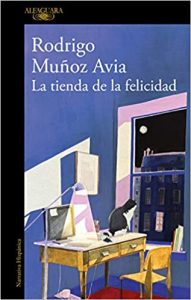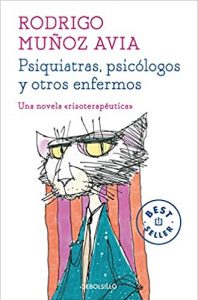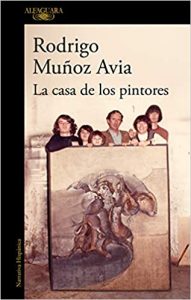We can group types of writers (and we will not be right, but the point is to give play to our logical reason), according to their more chronic or more emotional side. In other words, on the one hand, there are narrators who tell us stories and on the other we have those who tell us how those stories feel. Rodrigo Munoz Avia it is more than sensations. And the matter then becomes more difficult but more important as a reward.
In the noble art of novelizing the sensory few achieve excellence. If anything Milan Kundera o Jose Luis Sampedro. For Muñoz Avia's part, she gives herself to the mission from the truth and conviction, sprinkling her own blood with a metallic aroma, raw adorned in her case with a disconcerting and magical humor. So it is always appreciated that in his role as a novelist he decides to touch the arguments with more edges. Because everything else is that, more, easier ...
The greatest sensations are those that come to us from the past with that melancholic point. The smell of wood in the fire or an old perfume that occasionally assaults us from the wrong body. The will to compensate for sadness with that humor that comes out frankly from tears is the culmination of this writer's ingenuity.
Top 3 recommended novels by Rodrigo Muñoz Avia
The store of happiness
There was a time when Glattauer we were all fascinated by recovering the epistolary genre inserted in the midst of the thriving new technologies. And the thing of the e-mails in anticipation of the end of the letters in the middle of a romantic relationship of those of yesteryear caught us. It was about living a great sexual tension despite the absence of contact, with notes of frustration and hopelessness between hopes and wishes. Muñoz Avia deconstructs the epistolary towards the absurdity towards which technology and emails, whatsapp and what is to come finally pointed.
Carmelo Durán needs few things in life: a computer with internet, a supermarket online where to buy food in bulk and a few cyber interlocutors to argue with. But everything changes when an error in an order puts him in contact with Mari Carmen, the super customer service manager.
The Happiness Store is an epistolary novel, written in the form of e-mails, with an unforgettable protagonist, a quixotic mixture of the Ignatius of The conspiracy of fools and Helene from 84 Charing Cross Road. A story of real people, with their daily adventures, that will win a place in the hearts of readers.
Psychiatrists, psychologists and other sick people
The latinajo already warned him: Medice cure you ipsum. Which is the same, that no one is free from mental illness. Even less those who act as watchmen of normality, observers of philias and phobias capable of devouring the will of anyone or derived towards pathological channels of unsuspected final resolution. Nothing better than a novel on the subject, on the thresholds of reason that haunt us at the moment when we decide to analyze our path with determination in the depth of the existential. A matter as tragic as it is full of opportunities for a wise narrator of the grotesque, of our vital histrionics.
Rodrigo Montalvo is the height of placidity. His children, his wife and his cat love him madly. He works, very moderately, in his father's company and lives in a gigantic chalet. And besides, he is a happy man. Or at least, that has always believed.
Until one fine day a psychiatrist, his brother-in-law to be exact, begins to make him doubt. And the world falls on his head. Our hero wants to know what is wrong with him, and he visits the consultations of psychologists, psychiatrists, hypnotists and healers, who provide hilarious solutions and, of course, do not hesitate to loot his wallet. But the biggest surprise will not come to the end, and it will come from those who least expect it ...
Rodrigo Muñoz Avia manages to make us laugh and think at the same time. His novel Psychiatrists, psychologists and other sick people He reminds us between smiles that, rather than trying to be right in the head, the best goal for our simple lives should be to live content and make others a little happier.
The house of painters
As a kid I had a friend who was the son of a painter. And that bohemian scene in which he moved seemed to us then with the idyllic sensation of the most bucolic happiness. Neither television nor anything that could hinder a healthy conversation at my friend's house in a town on the slopes of Moncayo. Good morning those. In many nuances this book reminds me of that idealized vision saturated with the colors of creativity and ingenuity. No one better than the author to delve into this semblance of life made into a novel.
In this book I talk about who my parents were and what my life was like with them. One must write about what he knows the most, must share, in the most honest way that he is capable, the best story that he carries within. At this time this was my best story, my parents', my origin.
»I have always believed that to a large extent I am made of paint. My parents were plastic artists and they met and fell in love thanks to painting. In our house and in our family life, painting was everywhere. There was no space to be painters and a space to be parents or to be children. Everything was united. We were children of painting.
»I spent whole afternoons watching them work in their studios, fascinated by the plastic and artisan aspect of their trade. I loved having parents so different from those of my schoolmates and I let the aura that surrounded their creative work, with the recognition that I began to discover that I had, also surround me, as if being their child was a merit of mine. I loved and admired my parents very much, with their very different and unique personalities, and I wanted to stay all the time in their fabulous world of artists, political conversations and demands, dinners, trips, exhibitions here and there.
»The day my father died in 1998 and my mother in 2011, I discovered that I was not made of paint alone. Death did not take the artists, but it did take the people. The artist survives, lasts for everyone, but the son that I was had lost his parents. This book is about getting those people back and sharing them with others. "



